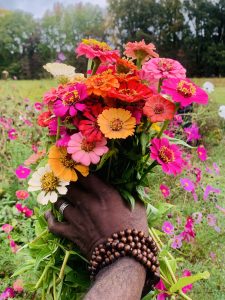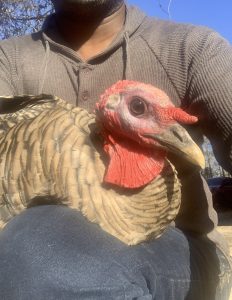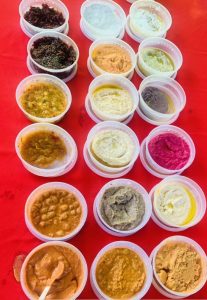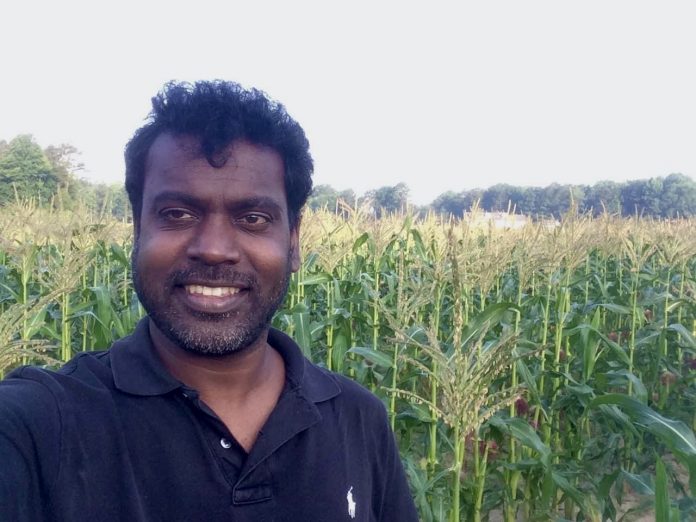Professor Sasikumar Balasundaram thinks the Williamsburg Farmers Market is the happiest place on earth. For three hours every Saturday, you can find him gleefully chatting with customers behind a rainbow of curries and under a sign that pithily sums up his life philosophy: “Partnering with earth and food to wage peace.”
As the owner of Spicy Kitchen Farm, founder of Harvest Earth International, and an adjunct lecturer of Asian and Middle Eastern Studies, everything Balasundaram does in his professional life is influenced by food.
“I always found growing food is pleasing. Because if you plant a seed you’re kind of looking forward to it. And then when you start growing certain plants, you take care of it, you have to water it, you’re nurturing it.”
Balasundaram first joined the College of William and Mary as an assistant professor in 2014 with a background in cultural anthropology. As soon as he began teaching, he noticed apparent patterns of stress, anxiety and depression throughout the College. Concerned by what he was seeing, Balasundaram sought to find creative ways to support his students.
“My thought was, one of the things I learned growing up in a village, I always found growing food is pleasing,” he said. “Because if you plant a seed you’re kind of looking forward to it. And then when you start growing certain plants, you take care of it, you have to water it, you’re nurturing it. So it’s just … it’s hopeful. So I was trying to teach classes which are hopeful.”
Realizing this, Balasundarum rented out a few garden plots on campus and had the students in his COLL class, “Growing up Global,” tend to them. Assignments included blogging about the garden and attending a demonstration about cooking cabbage in the styles of seven different cultures. Right away, Balasundaram saw growing excitement among his students as they watched their plants grow.
The success of that class inspired Balasundaram’s passion for using food as a basis for education, something he describes as “foodagogy.”
“Using your food as a tool to teach about society and culture and people, rights,” he said. “So you can use food to teach about anything … talk about the Chinese culture or Indian culture by how they cook. And then you can talk about rights, who has food rights and who doesn’t have it. Now you can talk about climate change.”
Teaching about food and gardening not only influenced Balasundaram’s students, but also left a lasting impact on him. One year, a student’s friend encouraged Balasundaram to visit KelRae Farm, the local farm that partners with the College’s dining services. Balasundaram fell in love with the work being done there and was inspired to buy a farm of his own in New Kent.

In 2017, Balasundaram left Williamsburg to pursue a job at Southern Illinois University Edwardsville where he continued to teach about food and racial justice. Four years later, Balasundaram ultimately decided to return to his farm in Virginia.
He now lectures classes at the College such as “Cuisines in Asia and the Middle East” in the Asian and Middle Eastern studies and Asian & Pacific Islander American studies departments.
“Mostly I teach about sustainability and climate change, those kind of things I care about most,” Balasundaram said. “I care about the people and the planet.”
Balasundaram’s primary focus is on being a full-time farmer, a profession that has brought him immeasurable joy.
“The financial life is much, much, much more stable being a farmer,” he said. “And also my quality of life increased by maybe 50 times.”
Farming was not a completely new concept to Balasundaram when he first purchased land in Virginia. He was raised on a tea plantation in Sri Lanka where his family grew almost everything they ate.
“Our ancestors went to Sri Lanka as indentured tea estate workers in the 1800s,” Balasundaram said. “So as soon as the British left, the locals saw that we were unwanted and disenfranchised and they took our citizenship for several generations.”
Being Tamil, an ethnic minority in Sri Lanka, Balasundaram endured discrimination, statelessness and riots growing up.
“We were economically and socially, politically marginalized,” he said. “So one of the survival strategies for us is to grow what we can because we were extremely poor.”
From his childhood, Balasundaram learned that he could survive nearly any hardship. He also picked up the art of gardening from his grandmother.
“We were economically and socially, politically marginalized. So one of the survival strategies for us is to grow what we can because we were extremely poor.”
“I learned about how to grow,” Balasundaram said. “Because those days, we were isolated communities. We didn’t have fertilizer or we didn’t have pesticide. We learn how to grow, work with the nature.”
In many ways, Balasundaram has come full circle in his return to farming. However, he recognizes that this pursuit is a privilege that he did not have before.
“It was a survival strategy,” Balasundaran said. “Now it’s my choice. I choose to. I have a PhD, I can make maybe $90,000 money. But I’m not interested in that. I’m interested in the quality of life.”
Balasundaran continues to use the practices he learned growing up. He credits his grandmother with giving him all his wisdom, despite the fact that she was illiterate.
“Those techniques, which was a sad thing at the time, but now it’s a privilege to know, it’s a skill,” Balasundaram said. “What I learned from my grandmother in not using pesticide or herbicide, now it’s a fashion, it is the future, it is science. And all of these things we can learn from our ancestors.”
Many of the traditional methods of gardening for Balasundaram’s family, which did not rely on pesticides or fertilizers, are becoming more mainstream as sustainable farming rises in popularity among Americans. This organic approach is vital to Balasundaram’s own farming ethos.
“I see the earth as an equal partner, not just the land that is created for me, but I just think I had to work with the land too, because I see the earth as a mother,” he said. “I want to take care of her because she gave me, she gave birth to me.”

For Balasundaram, farming is a way for him to connect with the earth and experience true peace. He tries to focus on living in the present rather than worrying about money, time or the future.
“In order to have peace, inner peace, you have to live in harmony with the nature, the environment, and you have to live in harmony with other people,” Balasundaram said.
Just like his approach to life, Balasundaram’s 10-acre farm does not resemble many other typical farms in Virginia. Instead, his garden is filled with produce from across the globe.
“I grow vegetables and things that this region doesn’t have,” Balasundaram said. “I grow vegetables from Asia and Middle East. I grow things that are very rare. I want to promote biodiversity and I also want to teach things that are disappearing.”
“In order to have peace, inner peace, you have to live in harmony with the nature, the environment, and you have to live in harmony with other people.”
Along with vegetables, Balasundaram raises all kinds of spices from ginger to turmeric. He also has a number of ducks, chicken and geese — each of which are named after “Golden Girls” and “I Love Lucy” characters.
Balasundaram aims to be as environmentally friendly as possible and put everything to use. For example, he turns bamboo into flower vases.
“I don’t see anything as a waste,” Balasundaram said. “People thinking of bamboo say, ‘They’re invasive, it’s a waste.’ But I think they’re not waste if you know how to use it.”
While Balasundaram doesn’t sell any produce, he cooks much of what he grows to be sold at his Spicy Kitchen Farm stand in the Williamsburg farmer’s market. Balasundaram is known for his vegetable curries, but makes dishes ranging from Greek to Chinese, depending on what he has in season. His personal favorites are anything with pepper or spice.
Balasundaram is happiest at the farmer’s market, which he considers to be the best three hours of his week. He loves people-watching and building relationships with his customers.
“It’s the best way to make friends and to interact because so many things you had looked for, and now people look for you,” Balasundaram said. “Every week they come in.”

Whatever Balasundaram doesn’t cook for Spicy Kitchen Farm or eat on his own, he donates to local food pantries in an effort to battle food insecurity and injustice. These are also issues Balasundaram is trying to combat with his newly-founded nonprofit Harvest Earth International.
“Harvest Earth International grows food, leaders, and community toward promoting food security, equity and sustainability,” the organization’s mission statement says.
Balasundaram began Harvest Earth in response to what he sees as three major issues facing the world: the climate crisis, the food crisis and inequality.
“They all relate to one another,” he said. “So I want to tackle that, locally. It’s a global issue, I come locally.”
Balasundaram is still applying for 501(c)(3) status, but already has lots of goals for Harvest Earth. A primary aim is promoting food sovereignty and small-scale growth among local communities.
“There’s a food crisis not because there is a lack of food,” Balasundaram said. “We refuse to engage… I want to influence the children. Growing food is a part of growing as a human.”
He is also concerned with supporting pollinators. Balasundaram has begun turning almost half of his land into a pollinator field, which he plans on additionally using as an educational resource.
“There’s a food crisis not because there is a lack of food. We refuse to engage… I want to influence the children. Growing food is a part of growing as a human.”
“When the last pollinator dies, then it is the end of humanity,” Balasundaram said. “I want to create a model and I’m trying to make it a classroom. So maybe students, instead of reading a book, they can just come in and learn from what’s happening.”
Harvest Earth’s ultimate vision is a world where everyone recognizes their relationship with nature and engages in practices sustainable for humans and the earth. To get there, Balasundaram believes that people need to shift their priorities.
“I think we need to go back,” he said. “We survived this far because people before us, our ancestors, took care of the land the… way it should be treated… If we keep doing things like what we do, we may not leave a good place for the next generation. So I think we need to rethink about humanity. Beyond money.”
Though combatting the climate crisis and promoting global peace are daunting tasks, Balsundaram sees hope in the power of food.
“Food is the best tool to bring people together,” he said. “You can dislike me, but you would still like the food I cook … In a divisive world I think we can use food as a uniting tool.”

